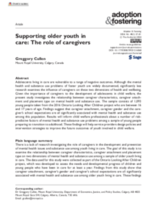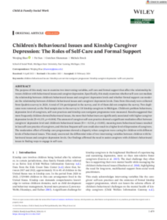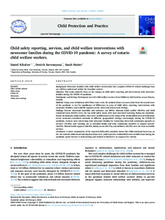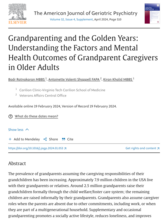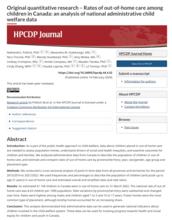This page contains documents and other resources related to children's care in the Americas. Browse resources by region, country, or category.
Displaying 161 - 170 of 3197
In this article, the authors present considerations related to the global mandate for child protection and the challenges that persist amongst marginalized communities. Subsequently, they focus on Canada and, in particular, the Ontario example: the trends from the Ontario Incidence Study of Reported Child Abuse and Neglect (OIS). This child welfare epidemiological project has highlighted the need for greater intersectional adjustments to best protect children, where the iterative research-policy cycle has most effectively been seen with a formal system for the inclusion of lived experience, as in the case of Indigenous peoples.
The long-term consequences of COVID-19 have been tough for children around the world, but even more so for young children already in humanitarian crises, whether due to conflict, natural disasters, or economic and political upheaval. Drawing on research and voices from the Global South, this book showcases innovations to mobilize new funds and reallocate existing resources to protect children during the pandemic.
The goal of this study is to examine the relationship between caregiver characteristics, caregiver attachment and placement type on two dimensions of mental health and substance use among a sample of older youth living in care in Ontario, Canada.
Not long before departing Congress to successfully pursue the mayor’s office in Los Angeles, former U.S. Rep. Karen Bass introduced a bill that would dramatically rewrite the federal rules around terminating parental rights.
Around the world, millions of children are growing up in orphanages, or children's homes as they are called in many places. But research has shown that the vast majority of them, actually have families.
The purpose of this U.S.-based study was to examine two intervening variables, self-care and formal support that affect the relationship between children with behavioural issues and caregiver depression.
This study based in Canada explored views on the changes in child safety reporting and interventions with newcomer families during the COVID-19 pandemic.
This report outlines the various trends and reasons for the rise of grandparents involved in caring for grandchildren in the U.S. It also describes the different types of households involving grandparents and grandchildren, including grandfamilies, skipped-generation, and three-generation families, and summarize various theories of grandparent stress including role strain theory and social exchange theory.
The authors analyzed administrative data from Canada to describe the population of children in out-of-home care, and estimate and compare rates of out-of-home care by province/territory, year, sex/gender, age group and placement type.
Newly published federal data reveals that more of the migrant children who are crossing the border by themselves are being placed in potentially hazardous living situations.



